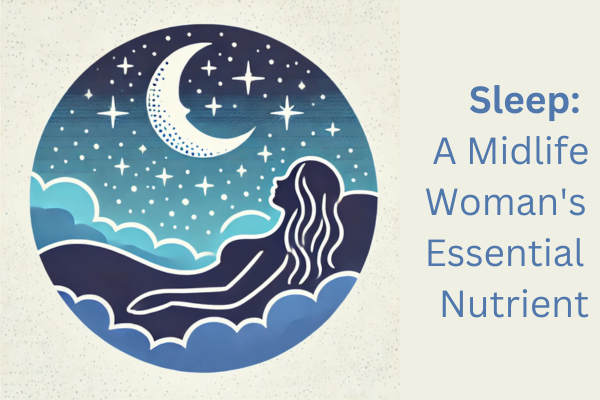
Sleep: A Midlife Woman’s Essential Nutrient – MEMBERS ONLY
Sleep, often overlooked or sacrificed in the hustle and bustle of midlife, is a vital component of overall health and well-being. It’s not just a time for rest; it’s a period of rejuvenation, repair, and cognitive restoration.
Why Sleep Matters
- Hormonal Balance: During sleep, your body regulates hormones such as cortisol (stress hormone) and melatonin (sleep hormone). Insufficient sleep can disrupt this balance, leading to mood swings, weight gain, and difficulty concentrating.
- Brain Health: Sleep is crucial for memory consolidation, problem-solving, and learning. As a midlife woman, you may be juggling work, family, and personal responsibilities. Adequate sleep helps you stay sharp and focused.
- Physical Health: While you sleep, your body repairs muscles, tissues, and cells. Lack of sleep can increase the risk of chronic diseases like heart disease, diabetes, and obesity.
- Immune System: Sleep plays a vital role in maintaining a strong immune system. When you’re well-rested, your body is better equipped to fight off infections.
 What Happens While You Sleep?
What Happens While You Sleep?
- Memory Consolidation: Your brain replays events of the day, solidifying memories and learning.
- Hormone Regulation: As mentioned earlier, sleep is essential for hormonal balance.
- Muscle Repair: Your body uses sleep to repair and rebuild muscles, especially after a workout.
- Tissue Repair: Cells throughout your body regenerate during sleep, helping to maintain healthy skin and organs.
Tips for Better Sleep
- Create a Sleep-Conducive Environment: Ensure your bedroom is dark, quiet, and cool. Invest in comfortable bedding and a supportive mattress.
- Stick to a Sleep Schedule: Try to go to bed and wake up at the same time each day, even on weekends.
- Limit Screen Time Before Bed: The blue light emitted from electronic devices can interfere with sleep.
- Manage Stress: Practice relaxation techniques like deep breathing, meditation, or yoga to reduce stress and improve sleep quality.
- Watch Your Diet: Avoid heavy meals and caffeine close to bedtime. Consider incorporating sleep-promoting foods like chamomile tea and almonds into your diet.
- Limit Alcohol: While alcohol may help you fall asleep initially, it can disrupt sleep later in the night.
By prioritizing sleep, midlife women can improve their overall health, well-being, and quality of life. It’s not just about catching enough z’s; it’s about ensuring that those z’s are restful and rejuvenating.
More of these in Sleep and Rest
Please Like our Facebook Page “Midlife Crisis Support“




This Post Has 0 Comments